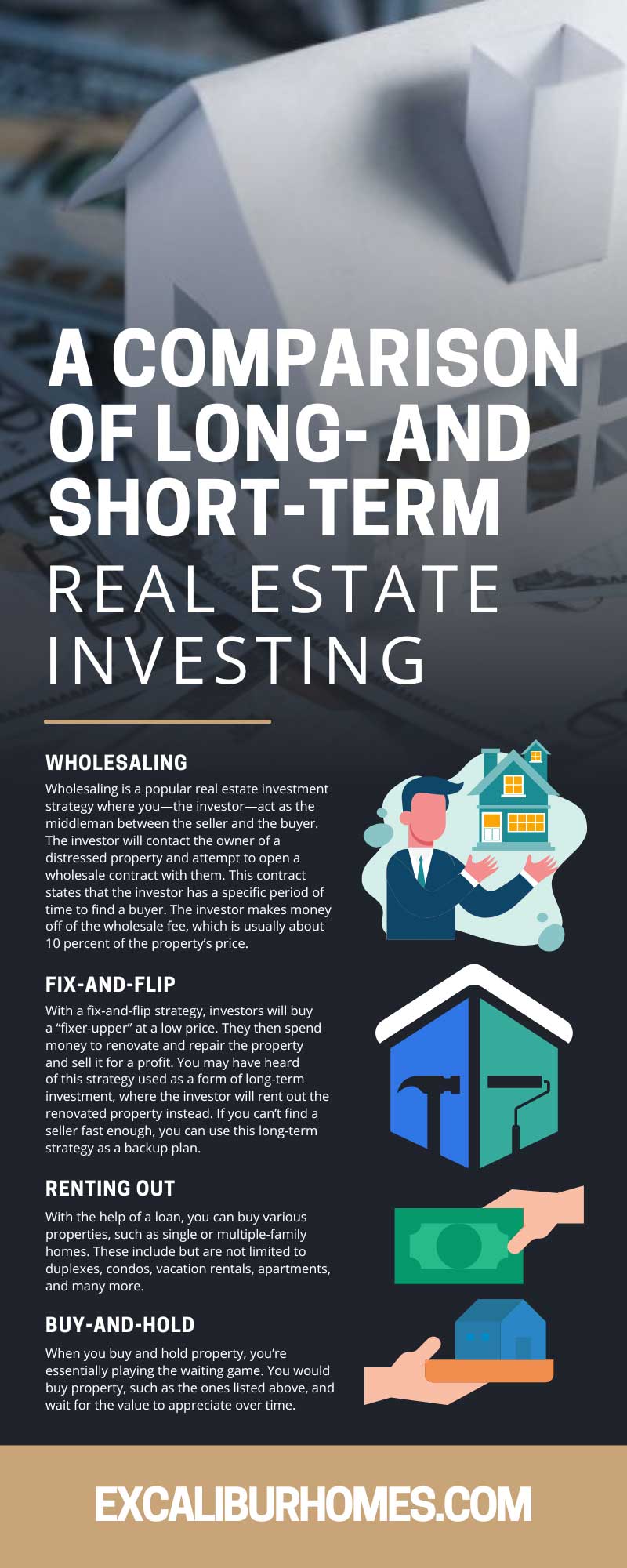
Before you jump into the world of investing, it’s always good to have an investment strategy, and when it comes to real estate investing, you have two main strategical options. You can either use long- or short-term investment strategies. If you aren’t familiar with these strategies or don’t know which one is right for you, this article will compare long-term and short-term real estate investing.
Types of Short-Term Investment
In terms of financial investments, short-term investments convert into cash in about five years, but in terms of real estate investments, this window is much shorter. With a short-term real estate investment, most investors will liquidate their property in around half a year, give or take a few months. Below are the two main examples of short-term real estate investing.
Wholesaling
Wholesaling is a popular real estate investment strategy where you—the investor—act as the middleman between the seller and the buyer. The investor will contact the owner of a distressed property and attempt to open a wholesale contract with them. This contract states that the investor has a specific period of time to find a buyer. The investor makes money off of the wholesale fee, which is usually about 10 percent of the property’s price.
Fix-and-Flip
With a fix-and-flip strategy, investors will buy a “fixer-upper” at a low price. They then spend money to renovate and repair the property and sell it for a profit. You may have heard of this strategy used as a form of long-term investment, where the investor will rent out the renovated property instead. If you can’t find a seller fast enough, you can use this long-term strategy as a backup plan.
Types of Long-Term Investments
Long-term real estate investments are assets that investors won’t liquidate into cash for over a year or longer—typically many years. Some investors never liquidate the property and use it as a steady flow of income or save for their retirement years.
Renting Out
As mentioned, you can fix a property and rent it out to tenants as a long-term investment strategy, but that’s certainly not the only way to do it. With the help of a loan, you can buy various properties, such as single or multiple-family homes. These include but are not limited to duplexes, condos, vacation rentals, apartments, and many more.
Buy-and-Hold
When you buy and hold property, you’re essentially playing the waiting game. You would buy property, such as the ones listed above, and wait for the value to appreciate over time. It can take many years for a property to appreciate. However, if you wait for the right moment, you’ll be able to sell the property for a lot more than the initial buying price.
The Pros of Short-Term Investments
High Reward
Using short-term investment strategies allows you to liquidate the property and turn it into cash much faster when compared to other strategies. While you may not make as much at one time, when compared to long-term investments, there is a much higher return. There’s also the bonus of not having to manage tenants.
Development and Diversification
Short-term strategies will teach you a lot about real estate investing very quickly, so if you’re looking for a crash course, this is the way to do it. It also allows you to manage multiple investments at once, meaning you can diversify your portfolio so that you don’t rely too heavily on one investment.
The Cons of Short-Term Investments
High Risk
There are a lot of hurdles that can crop up with short-term investments, many of them are unexpected, and there are factors that you can’t control. Unanticipated expenses can quickly burn through your cash, and you may end up losing a lot more than you expected.
Hard for Beginners
Because of the high risk, short-term investment strategies aren’t always the best for beginners. While wholesaling can help you dip your toe into the real estate waters, if you’re not a savvy seller, things may not work out in your favor.
The Pros of Long-Term Investments
Passive Income
When done correctly, long-term investments can bring in steady cash flow without you having to do too much tenant and property management. It’s a great option for those looking to secure their financial future, and you only need one or two properties to do so. If you know how to find good tenants, you’ll be set for years to come.
Tax Deductibles
While there are many expenses in managing and maintaining a rental property, most of these expenses are tax-deductible. Interest, insurance, and repair costs are all tax deductible. If you play your cards right, many professional repair and moving businesses are willing to offer their services for a discount in return for a steady stream of clientele.
The Cons of Long-Term Investments
Managing Tenants
Managing tenants is usually the biggest factor that turns people away from long-term investments. You may not be a people person, and having to rely on someone to pay their rent on time can be nerve-racking and frustrating. Plus, one bad tenant can cause a lot of stress and damage.
More Responsibility
On top of dealing with tenants, you have to learn a lot about state, local, and federal housing laws. If you aren’t up-to-date, you may end up with an FHA lawsuit, which no one wants to deal with. If you choose to be a private property manager, you’ll also have to market your own property, vet tenants, and deal with vacancies.
Which Investment Strategy Is Right for You?
Now that we’ve compared long- and short-term real estate investing, it’s time to step back and consider which strategy is right for you. Ultimately, no one strategy is necessarily better than the other, and often, it’s wise to do a mix of both. If you’re good with people and want a safe investment, long-term strategies may be for you. If you’re looking for a more fast-paced, hands-on experience that will make you fast cash, then short-term strategies can benefit you. Which strategy you choose depends on your available resources, knowledge, patience, and what you’re comfortable with overall.
If you want to make the passive income that comes with long-term rentals but don’t want to deal with tenant management, let Excalibur Homes help! We’re an Orlando rental management company with decades of experience and can provide you with a personal sales representative to manage your property. Whether you need help with leasing, managing, or the whole package, we’ll use our knowledge and dedication to provide your tenants with an experience they’ll want to renew their lease for!



